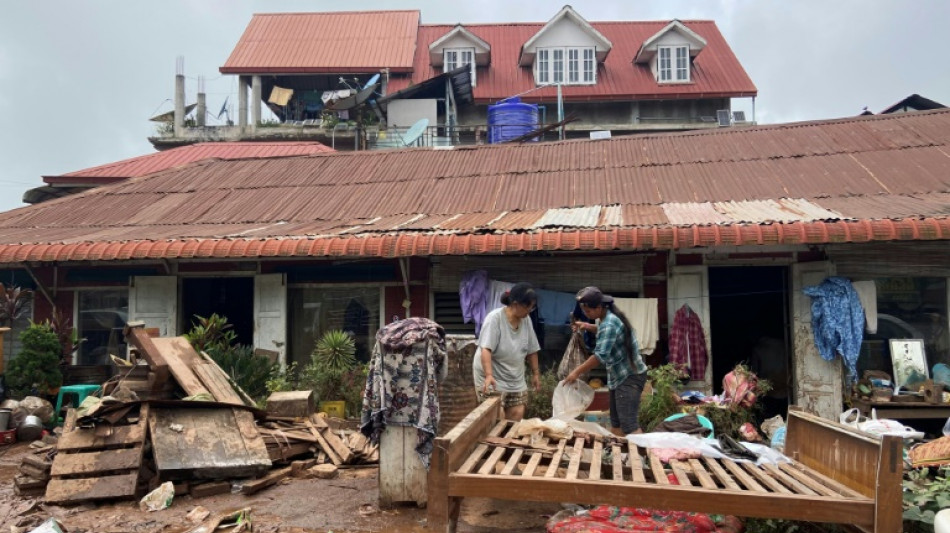
-
 Rodgers misery as Texans rout Steelers to advance in NFL playoffs
Rodgers misery as Texans rout Steelers to advance in NFL playoffs
-
Morocco's Bono 'one of best goalkeepers in the world'

-
 Salah and Mane meet again with AFCON final place on the line
Salah and Mane meet again with AFCON final place on the line
-
French museum fare hikes for non-European tourists spark outcry

-
 In 'big trouble'? The factors determining Iran's future
In 'big trouble'? The factors determining Iran's future
-
Osimhen finds AFCON scoring touch to give Nigeria cutting edge

-
 Trump announces tariffs on Iran trade partners as protest toll rises
Trump announces tariffs on Iran trade partners as protest toll rises
-
Sabalenka favourite at Australian Open but faces Swiatek, US threats

-
 Gay Australian footballer Cavallo alleges former club was homophobic
Gay Australian footballer Cavallo alleges former club was homophobic
-
Trump has options on Iran, but first must define goal

-
 Paris FC's Ikone stuns PSG to knock out former club from French Cup
Paris FC's Ikone stuns PSG to knock out former club from French Cup
-
Australia's ambassador to US leaving post, marked by Trump rift

-
 Slot angered by 'weird' Szoboszlai error in Liverpool FA Cup win
Slot angered by 'weird' Szoboszlai error in Liverpool FA Cup win
-
Szoboszlai plays hero and villain in Liverpool's FA Cup win

-
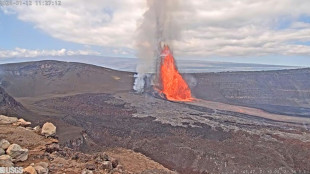 Hawaii's Kilauea volcano puts on spectacular lava display
Hawaii's Kilauea volcano puts on spectacular lava display
-
US stocks at records despite early losses on Fed independence angst
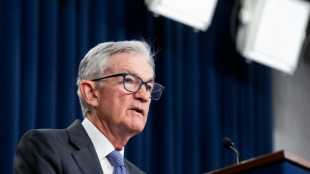
-
 Koepka rejoins PGA Tour under new rules for LIV players
Koepka rejoins PGA Tour under new rules for LIV players
-
Ex-France, Liverpool defender Sakho announces retirement

-
 Jerome Powell: The careful Fed chair standing firm against Trump
Jerome Powell: The careful Fed chair standing firm against Trump
-
France scrum-half Le Garrec likely to miss start of Six Nations

-
 AI helps fuel new era of medical self-testing
AI helps fuel new era of medical self-testing
-
Leaders of Japan and South Korea meet as China flexes muscles

-
 Trump sets meeting with Venezuelan opposition leader, Caracas under pressure
Trump sets meeting with Venezuelan opposition leader, Caracas under pressure
-
Australia captain Alyssa Healy to retire from cricket

-
 US 'screwed' if Supreme Court rules against tariffs: Trump
US 'screwed' if Supreme Court rules against tariffs: Trump
-
NATO, Greenland vow to boost Arctic security after Trump threats

-
 Israel to take part in first Eurovision semi-final on May 12
Israel to take part in first Eurovision semi-final on May 12
-
How Alonso's dream Real Madrid return crumbled so quickly

-
 Ex-Fed chiefs, lawmakers slam US probe into Jerome Powell
Ex-Fed chiefs, lawmakers slam US probe into Jerome Powell
-
Former Panama leader on trial over mega Latin America corruption scandal

-
 Trump keeping Iran air strikes on the table: White House
Trump keeping Iran air strikes on the table: White House
-
Paramount sues in hostile bid to buy Warner Bros Discover

-
 Ugandan opposition leader Bobi Wine warns of protests if polls rigged
Ugandan opposition leader Bobi Wine warns of protests if polls rigged
-
Airbus delivers more planes in 2025

-
 Alonso leaves Real Madrid, Arbeloa appointed as coach
Alonso leaves Real Madrid, Arbeloa appointed as coach
-
UK pays 'substantial' compensation to Guantanamo inmate: lawyer
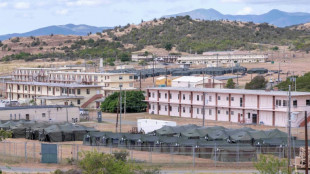
-
 Iran protest toll mounts as government stages mass rallies
Iran protest toll mounts as government stages mass rallies
-
Gold hits record high, dollar slides as US targets Fed
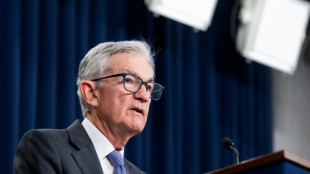
-
 Cuba denies being in talks with Trump on potential deal
Cuba denies being in talks with Trump on potential deal
-
Scientists reveal what drives homosexual behaviour in primates

-
 Venezuela releases more political prisoners as pressure builds
Venezuela releases more political prisoners as pressure builds
-
15,000 NY nurses stage largest-ever strike over conditions

-
 Rosenior plots long Chelsea stay as Arsenal loom
Rosenior plots long Chelsea stay as Arsenal loom
-
Zuckerberg names banker, ex-Trump advisor as Meta president

-
 Reza Pahlavi: Iran's ex-crown prince dreaming of homecoming
Reza Pahlavi: Iran's ex-crown prince dreaming of homecoming
-
Venezuela releases more political prisoners

-
 Kenya's NY marathon champ Albert Korir gets drug suspension
Kenya's NY marathon champ Albert Korir gets drug suspension
-
US prosecutors open probe of Fed chief, escalating Trump-Powell clash

-
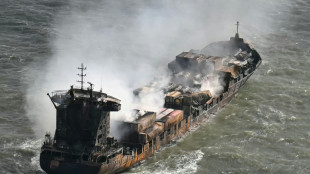 Russian captain in fiery North Sea crash faces UK trial
Russian captain in fiery North Sea crash faces UK trial
-
Carrick is frontrunner for interim Man Utd job: reports


Supercharged storms: how climate change amplifies cyclones
From Hurricane Helene to Typhoon Yagi, powerful storms are battering the globe, and scientists warn that a warming planet is amplifying their destructive force to unprecedented levels.
Here's what the latest research reveals about how climate change is supercharging tropical cyclones -- the generic term for both weather phenomenon.
- Packing more punch -
First, the basics: warmer ocean surfaces release more water vapor, providing additional energy for storms, which intensifies their winds. A warming atmosphere also allows them to hold more water, boosting heavy rainfall.
"On average, the destructive potential of hurricanes has increased about 40 percent due to the 1 degrees Celsius (roughly 2 degrees Fahrenheit) warming that has already taken place," Michael Mann, a climatologist at University of Pennsylvania, told AFP.
In a recent paper in the Proceedings of the National Academy of Sciences (PNAS), Mann added his voice to calls for the Saffir-Simpson scale to be expanded to include a "new class of monster storms" -- Category 6, where sustained winds exceed 192 miles per hour (308 kph).
According to experts, climate change set the stage for Helene, which peaked as a Category 4 hurricane.
"The oceanic heat content was at a record level, providing plenty of fuel and potential for a storm like this to gain strength and become a large and very damaging storm," David Zierden, Florida's state climatologist, told AFP.
- Rapid intensification -
"Rapid intensification," defined as a hurricane speeding up by 30 knots within a 24-hour period, is also becoming more common.
"If intensification happens very close to the coast in the lead up to landfall, it can have a huge effect, which you saw last week in the case of Helene," Karthik Balaguru, a climate scientist at the Department of Energy’s Pacific Northwest National Laboratory, told AFP.
Balaguru was the lead author on a paper this year in journal Earth's Future that used decades of satellite data to show "a robust increase in the rates at which storms intensified close to the coast, and this is across the world."
The explanation is two-fold.
Warming climate patterns are reducing wind shear -- changes in wind speed and direction with height -- along both the Atlantic Coast of North America and the Pacific Coast of Asia.
"When you have strong wind shear, it tends to tear apart the core of the storm," explained Balaguru.
Climate change is also driving higher humidity along coastlines compared to the open ocean.
This is likely due to a thermal gradient created as land heats faster than water, causing changes in pressure and wind circulation that push moisture into the mid-troposphere where storms can access it. More data is needed to confirm this hypothesis.
Additionally, rising sea levels -- about a foot over the past century -- mean cyclones are now operating from a higher baseline, amplifying storm surges, said Zierden.
- How often? -
While the impact of climate change on how often cyclones happen is still an active area of research, studies suggest it can either increase or decrease frequency, depending on the region.
Particle pollution generated by industry, vehicles, and the energy sector blocks sunlight, partially offsetting the warming effects of greenhouse gases.
In a Science Advances paper, Hiroyuki Murakami, a physical scientist at the National Oceanic and Atmospheric Administration, found that particle emissions from the US and Europe peaked around 1980, and their decline leading to a rise in hurricane frequency in the Atlantic.
Conversely, in Asia, high pollution levels in China and India may be suppressing more frequent storm in the western Pacific, Murakami told AFP.
Another study he led found that human activity has increased tropical cyclone activity off Japan’s coast, raising the risk of rare precipitation events in the country's west through frontal rainbands—even when the storms themselves don’t make landfall.
This year's North Atlantic hurricane season was initially projected to be highly active. However, various meteorological factors created a lull from August through September, according to Zierden and Murakami.
Now, though "we've seen a dramatic ramp-up over the past week," said Mann. With hurricane season running until November 30, we're not in the clear yet, he stressed.
D.AbuRida--SF-PST



